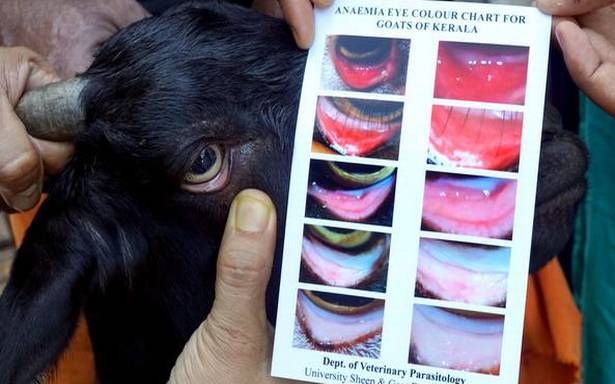Dr. K. Syamala of Assistant Professor at the College of Veterinary and Animal Sciences in Thrissur develops farmer-friendly utility as part of doctoral research
A farmer-friendly eye card, which can be used to detect worm infection in goats, has been developed by an Assistant Professor at the College of Veterinary and Animal Sciences (CVAS), Mannuthy.
The ‘Anaemia Eye Card’, suitable for goats in humid tropics and can be used even by illiterate farmers, was developed as part of doctoral research by K. Syamala in the Department of Veterinary Parasitology, CVAS.
Gastro-intestinal parasitism is deemed a major health concern in goats. Due to the indiscriminate use of anthelmintic (drug used to treat parasitic worm infection) for the control of helminth (worm) infection, anthelmintic resistance has become a concern in countries that majorly rear sheep or goats, says Dr. Syamala.
Targeted selective treatment approach, using farmer-friendly tools, is found to be ideal for sustainable nematode control.
Dr. Syamala’s eye card has been developed based on FAMACHA, an anaemia eye card developed in South Africa exclusively for sheep.
Simple use
“The use of the card is quite simple. A farmer can compare the colour of conjunctival mucous membranes of the goat with the eye card, which bears colour gradation depending on the infection severity,” Dr. Syamala says.
For instance, anaemia scores (AS) corresponding to the colour of the membranes are calibrated as follows — AS 1: red, AS 2: red-pink, AS 3: pink, AS 4: pink-white and AS 5: white.
Goats with AS 1 and AS 2 need not be treated, and those with AS 3 may be observed after two weeks for further evaluation and treatment. Goats with AS 4 and AS 5 have to be treated.
With the effective utilisation of the eye card, it is possible to reduce the anthelmintic usage by about 72%. This will help avoid unnecessary use of medication and thus will contain drug resistance, notes Dr. Syamala.
The eye card has been developed subsequent to the validation in 1,500 goats of 13 different agro-ecological zones in the State.
The research was conducted under the guidance of Dr. K. Devada, former director (Academics and Research), Kerala Veterinary and Animal Sciences University (KVASU). This project was carried out under the technical and financial support of the KVASU and Indian Council of Agricultural Research-All India Coordinated Research Project on ‘goat improvement’.
Source: Read Full Article

